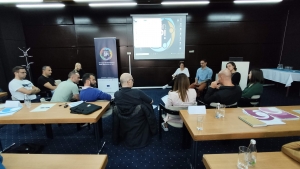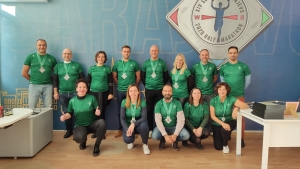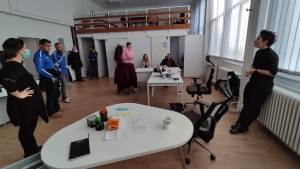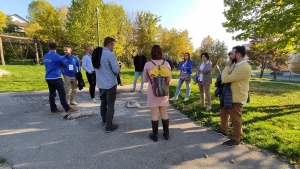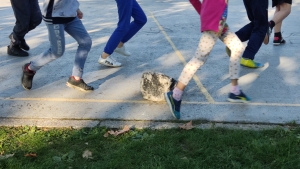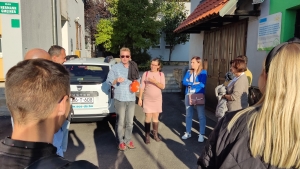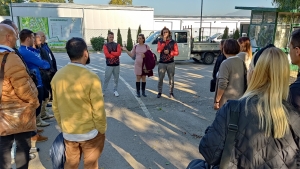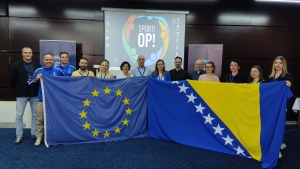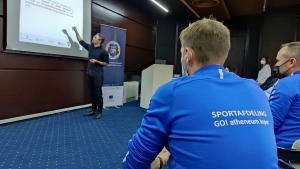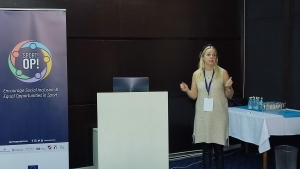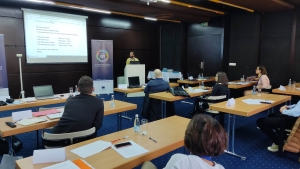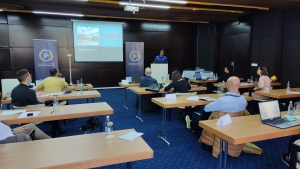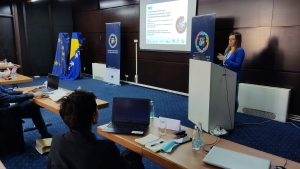The purpose of the Sport!OP! (Opportunities for inclusion of vulnerable youth through sport) project is to develop local community-based strategies using sports as a vehicle of social inclusion of the most vulnerable and at risk children and adolescents.
The project will focus on municipalities of small and medium size and takes a multistakeholder approach, in which public, private and voluntary organizations of each region have an interest and a role to play.
Municipality of Granollers (ES) is acting as lead partner of the project, and the University of Barcelona (ES), the Municipality of Grigny (FR), the Atheneum Ieper (BE), the LUGI Handbollsförening (SE), the HASK Mladost (HR) and the Marathon Sarajevo Club (BA) are brought together to create and consolidate a local community-based strategy embracing sporting activity as a primary vehicle for social inclusion.
Our findings to date highlight the needs and the expectations of the different stakeholders (municipalities, sport organizations, children, adolescent and youngsters) involved in the project.
What have we done?
First, we agreed on a conceptual framework to be used as a starting point for the project. You can consider it our hypothesis of work.
We are deeply convinced that sport activities are capable of delivering positive educational & life-skills related outputs when nurtured through a deliberately designed and purposeful educational strategy.
At the same time, we truly believe that those educational outputs have a potential long-term impact on the social inclusion of children and youngster at risk. Just in the way it is showed in the graphic below:
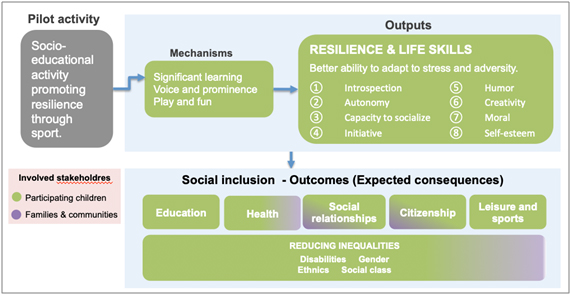
Second, in order to start putting this ideas together, we have already identified some needs and potentialities in order to facilitate (at later stages in the project) to design, develop and carry out a pilot project based on sound methodological guidelines for sport organizations working with vulnerable children and youth.
The University of Barcelona (UB) have been leading this “Analysis of needs and opportunities” activities supported by a team of 5 researchers with significant experience in children development and building of resilience through sport.
Analyzing the needs and benefits of sports activities as strategies of socio-educative action, both quantitative and qualitative inquire have been carried out in each country.
Quantitative inquire
What this has been about?
-
It has been distributing a questionnaire for children and adolescents at risk, involved or not in sport activities, identified as potential beneficiaries of the pilot project that will be carried out at later stages of the project.
What are the objectives of the questionnaire?
-
To understand and correctly assess all the different situations and expectations that potential beneficiaries (children and youth) hold towards sport and physical activity.
-
To assess what weaknesses and strengths the trainers, coaches and instructors have when it comes to build children and youth resilience and life skills.
How many children and youth have been invited to complete the questionnaire?
-
752 children, adolescents and youngsters in vulnerable situations from the cities of Granollers, Grigny, Ieper, Lund, Zagreb and Sarajevo. The questionnaire has been distribute/shared using a public URL and emailed out to the audience and shared via other social media channels. The questionnaire has been operated through smartphones, Tablet PCs or computers.
During the complementation of the questionnaire an adult has been around to help the children if needed. This adult has been a different person from the trainer who leads the physical activity they are involved with, and anonymity has been protected at any time.
Qualitative enquire:
What this has been about?
It has been about celebrating a virtual participatory workshop with sport managers, coaches, trainers, instructors and volunteers as well as other stakeholders from Granollers, Grigny, Ieper, Lund, Zagreb and Sarajevo.
What are the objectives of the workshop?
-
To understand and correctly assess all the different situations and inequalities that potential beneficiaries face when it comes to access sport and physical activity.
-
To assess what weaknesses and strengths the sports trainers, coaches and instructors have when it comes to build children and youth resilience and life skills.
What have we learned so far?
We have already said that Sport!Op! project is focusing on teaching life-skills based strategies among trainers, coaches and instructors. In doing so, sound training and methodological guidelines will be provided to carry out a participatory experimentation of a socio-educational proposal among different sport organizations.
And when it comes to design this sound training and methodological guidelines, it has been very useful to find out that the expectations and opinions among surveyed children distributes this way:
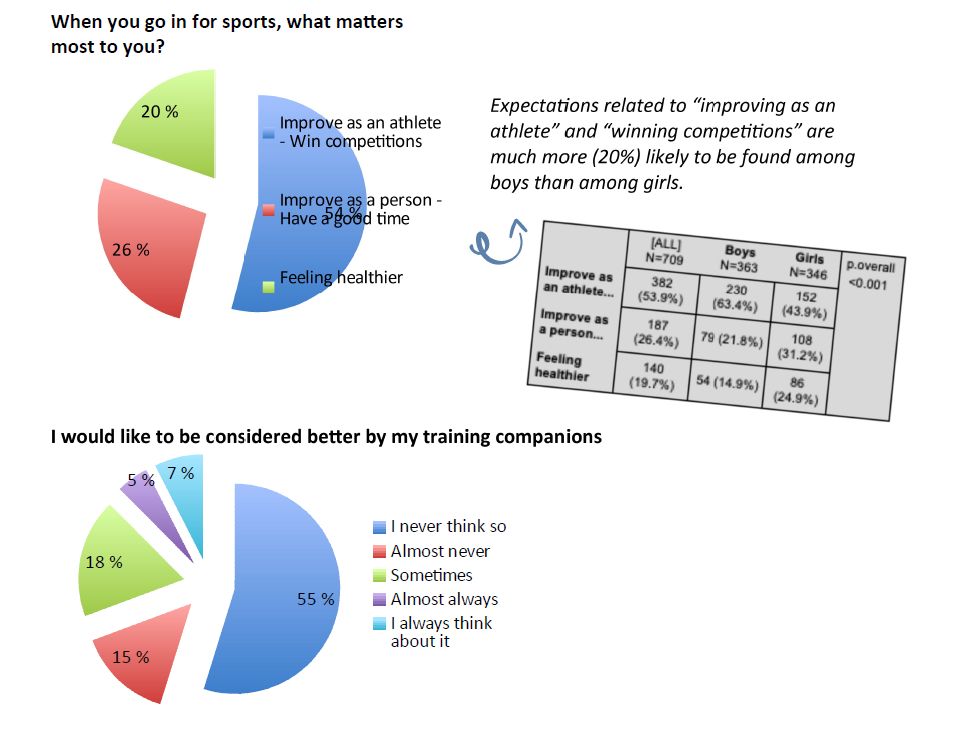
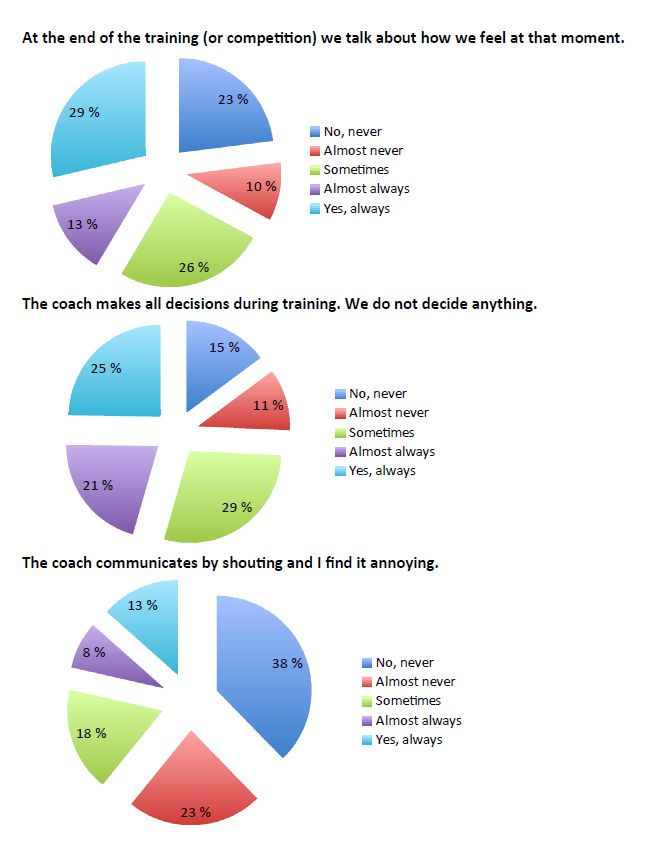
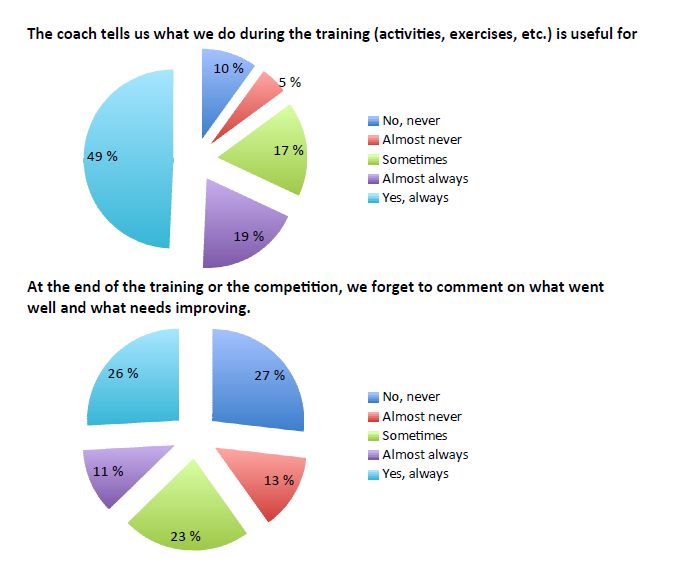
These learning’s, among others, have been of a great help in providing a better understanding of what kind of context we are dealing with when it comes to design a purposeful educational strategy for coaches (aimed at delivering life-skills related outputs among children).
In the upcoming months SportOp! project will continue to work with the partners, remotely and (hopefully) in-person, to:
- Create a common understanding on why (and under which circumstances) using sport to promote competence in youth has benefits (positive development) and risks.
- Further shape the pilot projects to be implemented in each country and define their particular outcomes.
Meet the UB Team!
Albert Batalla is a Senior Lecturer in the Faculty of Education at the University of Barcelona. He has been Dean of the Faculty of Teacher Training at the University of Barcelona (UB) between 2008 and 2010.
Ramon Crespo has been acting as an independent evaluator since 2006. His experience in evaluation related work focuses on the areas of youth policy and community development.
Teresa Lleixà is a Senior Lecturer in the Faculty of Education at the University of Barcelona. She teaches the Masters course of Physical Activity and Education and the degree of Teacher Training.
Anna Mundet, PhD in Pedagogy, in the program Society and Education. She has been working in the Department of Methods, Research & Diagnosis in Education in the Faculty of Education at the University of Barcelona since 2010.
Montserrat Simó, PhD in Sociology, has been working in the Department of Sociology and Analysis of Organizations at the University of Barcelona since 1999. She is a member of the research group “Creativity, Innovation and Urban Transformation” of the same university.
